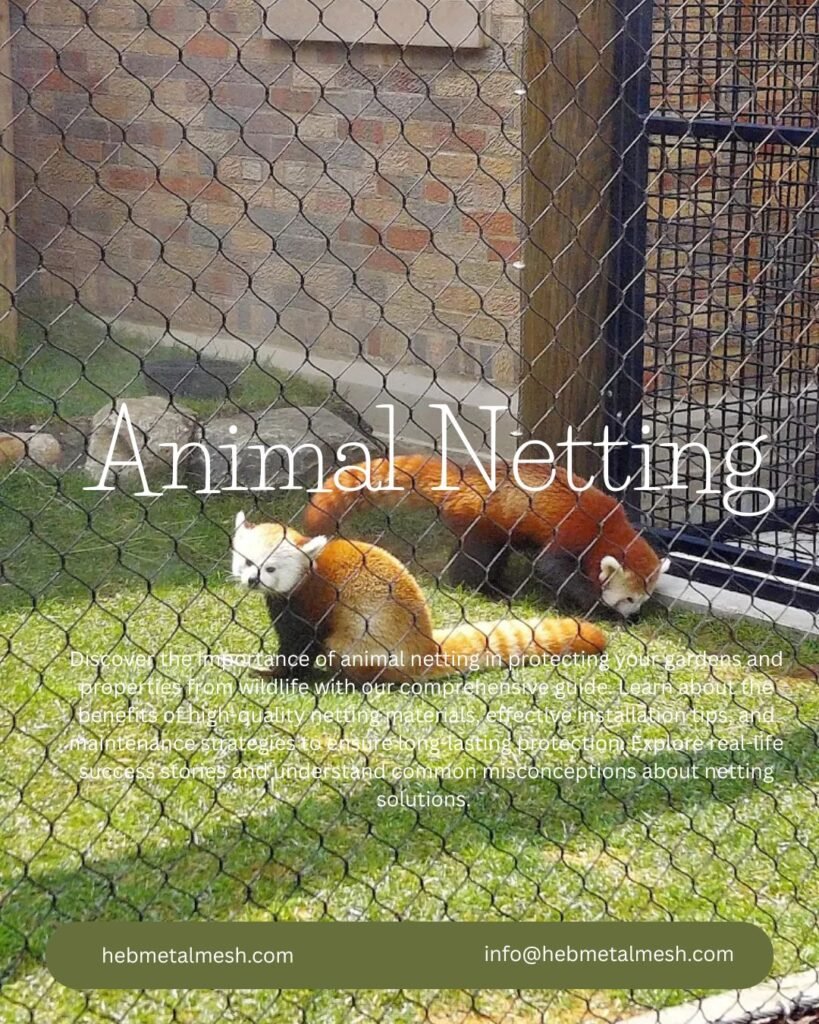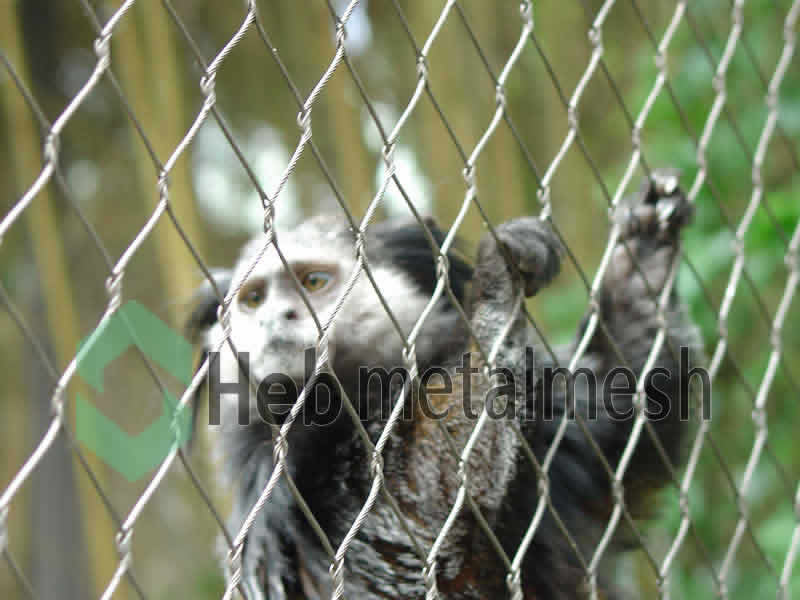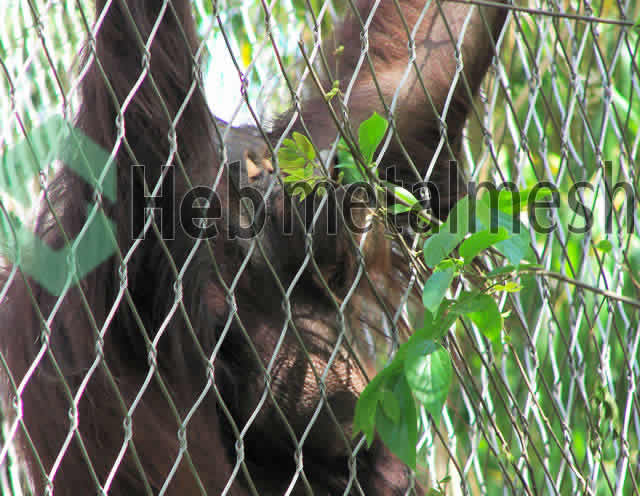For any small-scale farmer or homesteader, the security of your livestock is the foundation of your success. Species-appropriate farm animal enclosures are more than just physical boundaries; they are the primary defense against predators, the key to effective pasture management, and a fundamental requirement for animal welfare. A breach in security doesn’t just result in lost revenue—it results in the loss of animals you have invested time, care, and resources into raising.
Choosing the right solution can be overwhelming. Farmers often face a trifecta of challenges: relentless predator pressure, animals that are “escape artists” (like goats), and the rapid corrosion of cheap fencing materials. Drawing on years of experience supplying professional-grade fencing solutions to zoos, wildlife parks, and farms globally, Hebmetalmesh (Shijiazhuang Netting Trading Co., Ltd) breaks down the key considerations for building structures that last a lifetime.
To build the best farm animal enclosures, farmers must balance animal behavior with predator-proof materials. Key solutions include high-tensile perimeter fencing, custom-sized handwoven stainless steel mesh for high-impact areas, and integrated skirting to prevent digging. Investing in corrosion-resistant materials like 304/316 stainless steel significantly reduces long-term maintenance costs.
Part 1: Understanding Your Farm Animal Enclosure Needs
Before purchasing materials, you must conduct a site and species audit. What works for a docile cow will not contain a nimble Boer goat or protect a flock of heritage chickens from a determined fox.
Factors Determining the “Best” Enclosure Type
- Animal Species & Behavior: Consider the “intelligence” and physical capabilities of your stock. Goats climb and rub; pigs root and push; poultry are vulnerable to both aerial and ground attacks.
- Enclosure Purpose: Is this a permanent perimeter, a temporary rotational grazing cell, or a high-security birthing pen?
- Local Predator Pressure: Identify your neighbors. Are you defending against coyotes, foxes, stray dogs, or climbing predators like raccoons and bobcats?
- Climate and Environmental Conditions: High-humidity or coastal environments will destroy galvanized steel in a fraction of the time it takes to wear down stainless steel.
Overview of Common Farm Animal Enclosure Types
- Pasture Fencing & Perimeter Enclosures: Generally used for larger livestock like cattle or horses. This often involves high-tensile wire or post-and-rail systems.
- Paddocks and Holding Pens: Smaller, high-traffic areas for sheep, goats, and pigs that require high-durability panels to withstand constant leaning and rubbing.
- Coops and Hutch-Style Enclosures: Focused on small livestock (poultry, rabbits) where the priority is keeping small predators out rather than keeping the animals in.
- Walk-In Aviaries & Flight Cages: Increasingly popular for poultry and exotic birds. These covered runs provide total security from hawks and owls.
- Custom Barnyard Fencing Solutions: Essential for farms with irregular terrain or those looking to integrate enclosures with existing barns and outbuildings.
Part 2: Deep Dive: Enclosure Solutions by Animal
Goat Enclosures: The Predator-Proof Blueprint
Goats are notoriously difficult to contain. They are “test-oriented” animals that will find every weak point in a fence.
How to Build a Predator-Proof Enclosure for Goats: A secure goat pen must be at least 4 to 5 feet high. However, height is only half the battle. Goats often stand on their hind legs and lean their full weight against the mesh. Standard welded wire often fails at the joints under this pressure.
The critical role of mesh specification cannot be overstated. Woven stainless steel mesh is the gold standard here because the hand-interlocked knots allow the mesh to “give” and spring back rather than snapping or deforming. For ultimate durability, many farmers opt for custom-sized, handwoven stainless steel mesh rolls (available in sizes up to 30′ x 60′ at Hebmetalmesh). These can be tailored to fit any pen design and are virtually impervious to rust and animal damage.
Sheep Fencing: Prioritizing Durability and Visibility
Sheep require fencing that prevents “head-stuck” incidents while being strong enough to deter coyotes.
Where to Buy Durable Sheep Fencing Panels: While searching for “sheep fencing panels near me,” consider the long-term value of sourcing from a specialized manufacturer. Local big-box stores typically carry galvanized options that may corrode within 5–7 years. Shijiazhuang Netting Trading Co., Ltd ships custom-cut, durable stainless steel mesh panels globally. These panels provide a lifetime solution, maintaining their structural integrity even in harsh winter climates where salt and moisture are prevalent.
Poultry & Small Livestock Enclosures
For chickens, ducks, and turkeys, the enclosure must be a “fortress.” This means securing the top against hawks and the bottom against digging foxes. Using a black oxide stainless steel mesh is a brilliant choice for garden-based enclosures. The black finish absorbs light, making the mesh nearly invisible to the human eye, allowing you to enjoy the view of your birds while providing them with the highest level of protection.
Professional Farm Animal Enclosure Mesh | Zoo-Grade Security & Durability
Secure your livestock and peace of mind with our professional-grade Farm Animal Enclosure mesh from Hebmetalmesh. Engineered to the highest standards, this heavy-duty stainless steel mesh is the ultimate solution for creating safe, durable, and long-lasting enclosures for poultry, goats, sheep, pigs, and other livestock.
Crafted from premium Stainless Steel 304, this mesh offers exceptional resistance to rust, corrosion, and the elements, ensuring your investment withstands years of harsh weather and wear. The optimal 2 inch by 2 inch (2″ x 2″) mesh size effectively contains animals while maintaining excellent visibility and airflow, promoting a healthier environment.
Key Features & Benefits:
- Zoo-Grade Strength: With a substantial 5/64″ wire thickness, this mesh provides superior resistance to impact, chewing, and predator attacks, offering security comparable to professional zoological installations.
- Maximum Coverage & Value: Each 30 feet x 60 feet roll offers extensive coverage, making it a cost-effective choice for large runs, pasture dividers, or perimeter fencing.
- Built to Last: Stainless Steel 304 construction ensures unparalleled durability and minimal maintenance—no more replacing rusted wire every few seasons.
- Safety-First Design: The smooth, welded mesh pattern prevents injuries from sharp edges, safeguarding both your animals and handlers.
- Customizable Solutions: We offer custom sizing and cutting, along with your choice of a natural metallic finish or a sleek Black Oxide coating for reduced glare and enhanced aesthetics.
Ideal For:
- Secure Chicken Coops & Poultry Runs
- Goat, Sheep, and Alpaca Enclosures
- Pig Pens and Sow Fencing
- Livestock Pasture Dividers & Lane Fencing
- Aviaries and Large Bird Enclosures
- General-Purpose Heavy-Duty Animal Containment
Product Specifications:
- Material: Stainless Steel 304
- Mesh Size: 2″ x 2″ (50mm x 50mm)
- Wire Diameter: 5/64″ (2.0mm)
- Roll Dimensions: 30 ft wide x 60 ft long
- Color: Natural Stainless Steel or Black Oxide
- Customization: Available upon request
Invest in the safety and security of your farm animals with this industrial-strength fencing solution. This isn’t just wire mesh; it’s a lifetime investment in reliable livestock management.
Price: $2,250.00 per roll
Ready to fortify your farm? Explore this premium enclosure mesh and discover the Hebmetalmesh difference in quality and durability.
Brand: Hebmetalmesh – Engineering Confidence in Every Mesh.
Part 3: The Material Science of Lasting Enclosures
The “cheapest” fence is often the most expensive over a ten-year period due to replacement costs and potential livestock loss.
Stainless Steel Mesh vs. Traditional Materials
| Feature | Galvanized Steel | PVC Coated Wire | Handwoven Stainless Steel |
|---|---|---|---|
| Initial Cost | Low | Medium | Higher |
| Lifespan | 5-10 Years | 8-12 Years | 30+ Years |
| Predator Resistance | Moderate | Moderate (Coating peels) | Extreme |
| Weather Resistance | Low (Rusts) | Moderate | High (Non-corrosive) |
| Maintenance | High | Moderate | Zero |
| Animal Safety | Risk of wire snaps | Risk of ingestion | Highest (Smooth knots) |
Spotlight on Handwoven Stainless Steel Mesh
The “handwoven” advantage lies in the flexibility of the structure. Unlike rigid welded wire, our customized handwoven stainless steel netting rolls allow you to cover large spans (up to 30′ x 60′) seamlessly. This reduces the number of joins—the most common point of failure in any fence.
Whether you choose the Natural Stainless Steel look or the Black Oxide option, you are investing in a material that does not require painting, coating, or frequent tensioning. For more on stainless steel properties, see our comprehensive material guide here.
Part 4: Planning & Implementing Your Enclosure Project
Design Principles for Security and Animal Welfare
- The “Dig Zone”: Always bury at least 12 inches of mesh underground or create an L-shaped “skirt” pinned to the ground to stop burrowing predators.
- Corner Bracing: Every secure enclosure is only as strong as its corners. Use heavy-duty posts (wood or steel) and ensure they are set below the frost line.
- Tensioning: Handwoven mesh should be pulled taut but not over-stressed. Its natural elasticity is what allows it to absorb the impact of a charging animal without breaking.
Companies That Specialize in Custom Barnyard Fencing Solutions
In many cases, a standard 4-foot roll of wire simply won’t cut it. If you have irregular terrain or are building a large-scale aviary, you need a provider that understands custom dimensions. As a company specializing in custom barnyard fencing solutions, Hebmetalmesh works directly with farmers. We provide technical drawings and produce mesh to your exact specifications, ensuring a perfect fit for your unique habitat—applying the same rigor we use for major international zoos.
Part 5: FAQs About Farm Animal Enclosures
A: Heavy-gauge, handwoven stainless steel mesh offers the best combination of predator-proof strength and long-term corrosion resistance. It withstands the “climbing and leaning” behavior of goats better than any other material.
A: For coyotes, a minimum of 6 feet is recommended. To be truly secure, include an outward-facing overhang or a buried “apron” of mesh to prevent digging. Sturdy mesh with apertures no larger than 2″x2″ is essential.
A: A 3/64″ x 1″x1″ stainless steel mesh is ideal. It is small enough to keep out rodents and snakes while being strong enough to stop hawks, foxes, and raccoons.
A: Yes. Our black oxide stainless steel mesh undergoes a chemical process that turns the steel black without using a plastic coating that can peel. It is just as rust-resistant as natural stainless steel.
Conclusion
Building effective farm animal enclosures is an investment in your farm’s future. By focusing on the “right design, right material, and right installation,” you eliminate the stress of predator attacks and the labor of constant repairs. Professional-grade materials, like those provided by Hebmetalmesh, offer a lower total cost of ownership by lasting decades longer than standard agricultural fencing.
Ready to secure your livestock with a solution that lasts?
- Explore our range of durable, customizable stainless steel mesh solutions at the Hebmetalmesh Store.
- Contact our team today for a quote on custom-sized rolls or panels tailored to your specific project.


